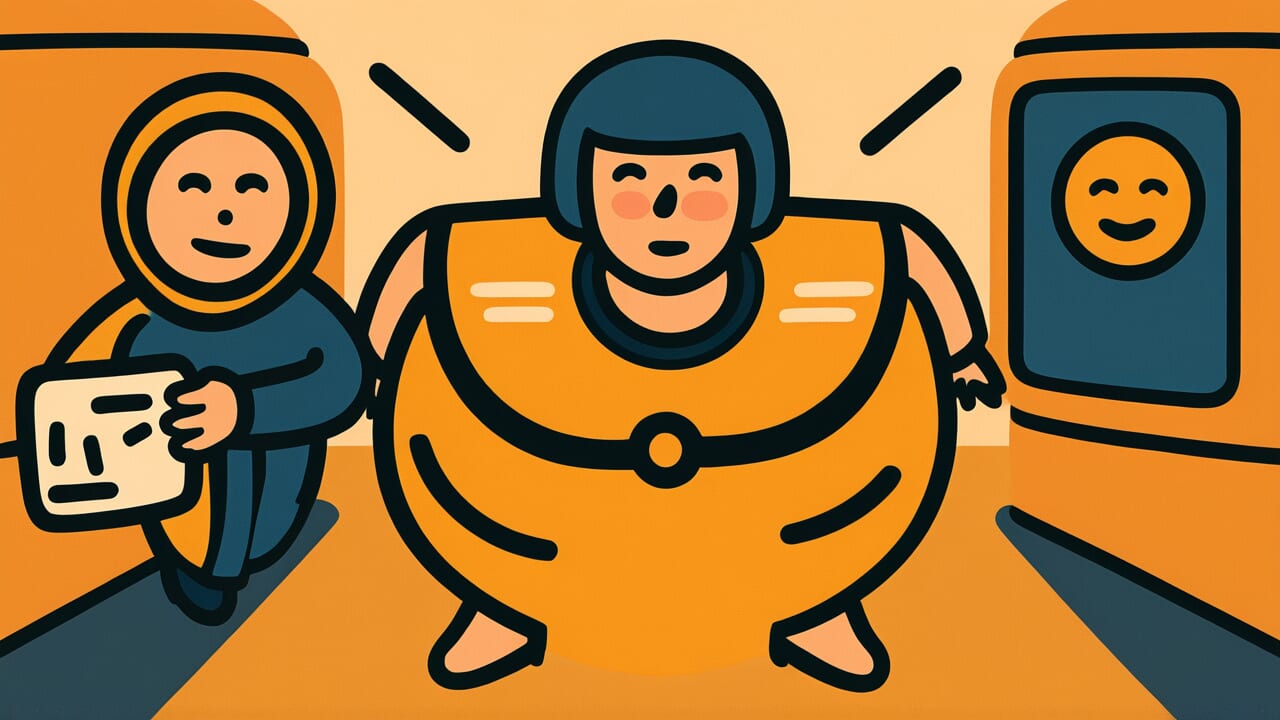How to Read “The eye is bigger than the belly”
“The eye is bigger than the belly”
[thee AYE iz BIG-er than thee BEL-ee]
All words use standard pronunciation.
Meaning of “The eye is bigger than the belly”
Simply put, this proverb means we often want more than we can actually handle or use.
The saying compares our eyes to our stomach. Your eyes see delicious food and want everything. Your belly has limits on how much it can hold. The proverb suggests our desires often exceed our actual capacity. We think we want more than we truly need or can manage.
This applies far beyond food in daily life. People buy clothes they never wear. Students sign up for too many activities. Workers take on more projects than they can finish well. Our wants often outgrow our real abilities or needs.
The wisdom reveals something interesting about human nature. We naturally overestimate what we can handle. Our imagination runs ahead of reality. Learning to recognize this tendency helps us make better choices. It reminds us to pause between wanting something and actually taking it.
Origin and Etymology
The exact origin of this proverb is unknown. Similar sayings about eyes and appetite appear in various forms across different languages. The concept has been expressed in folk wisdom for centuries.
This type of saying likely emerged from common human experience with food. Before modern abundance, people understood the difference between desire and capacity. Overeating was wasteful and could cause discomfort. Communities valued practical wisdom about managing resources wisely.
The proverb spread through oral tradition and everyday conversation. It moved beyond literal eating to describe any situation involving overreach. The simple comparison made it easy to remember and apply. Over time, it became a gentle way to warn against taking on too much.
Interesting Facts
The word “belly” comes from Old English meaning a bag or pouch. This connects to the idea of limited storage space. Many languages have similar sayings comparing vision to stomach capacity. The proverb uses a concrete physical comparison to explain an abstract concept about human behavior.
Usage Examples
- Mother to child: “You ordered three slices of pizza but only ate one – the eye is bigger than the belly.”
- Friend to friend: “He filled his plate at the buffet but left half the food – the eye is bigger than the belly.”
Universal Wisdom
This proverb captures a fundamental tension in human psychology between desire and capacity. Our brains evolved to notice opportunities and resources, often triggering wants that exceed our actual needs. This served our ancestors well when resources were scarce and unpredictable.
The disconnect between wanting and handling reflects how our minds work. We imagine future satisfaction more vividly than we predict future effort or consequences. Our eyes process information faster than our reasoning mind can evaluate realistic limits. This creates a gap between what looks appealing and what we can actually manage successfully.
The wisdom also reveals the challenge of living with abundance. When options are limited, choices become simpler. When everything seems available, our natural tendency to overreach becomes problematic. We must learn to self-regulate in ways our ancestors rarely needed. The proverb acknowledges this difficulty while gently pointing toward better judgment. It suggests that recognizing our tendency to overestimate capacity is the first step toward making choices that truly serve us.
When AI Hears This
Our minds work like computers with multiple browser tabs open. We can picture ourselves eating ten different desserts at once. But our bodies are stuck with dial-up internet. We must process each bite one at a time. This creates a cruel joke where imagination moves at light speed but reality crawls.
Humans never learned to translate between these two different speeds. Our brains still think we can handle everything we can see. It’s like having a sports car engine connected to bicycle wheels. We make plans based on our fast-thinking mind. Then we get frustrated when our slow-moving body can’t keep up.
This mismatch might actually be brilliant design rather than a flaw. The dreaming part pushes us to reach for more. The reality part keeps us grounded and safe. Without big eyes, we’d never try anything new. Without small bellies, we’d probably explode from trying everything at once. The tension creates perfect human-sized ambition.
Lessons for Today
Understanding this wisdom starts with honest self-reflection about past experiences. Most people can recall times when their enthusiasm exceeded their follow-through. Recognizing this pattern without harsh self-judgment creates space for better decision-making. The goal is awareness, not perfection.
In relationships and group settings, this wisdom helps create realistic expectations. When planning projects or events, acknowledging human tendency toward overreach leads to better planning. Teams that build in buffers and check capacity regularly tend to succeed more often. The proverb reminds us that good intentions need practical boundaries.
The deeper lesson involves learning to distinguish between genuine opportunity and mere temptation. Some desires deserve pursuit despite challenges, while others simply reflect our tendency to want more than we need. Developing this discernment takes practice and patience. The proverb offers a gentle reminder that wanting something intensely does not automatically mean we should pursue it. Wisdom lies in choosing desires that match our true capacity and values.



Comments